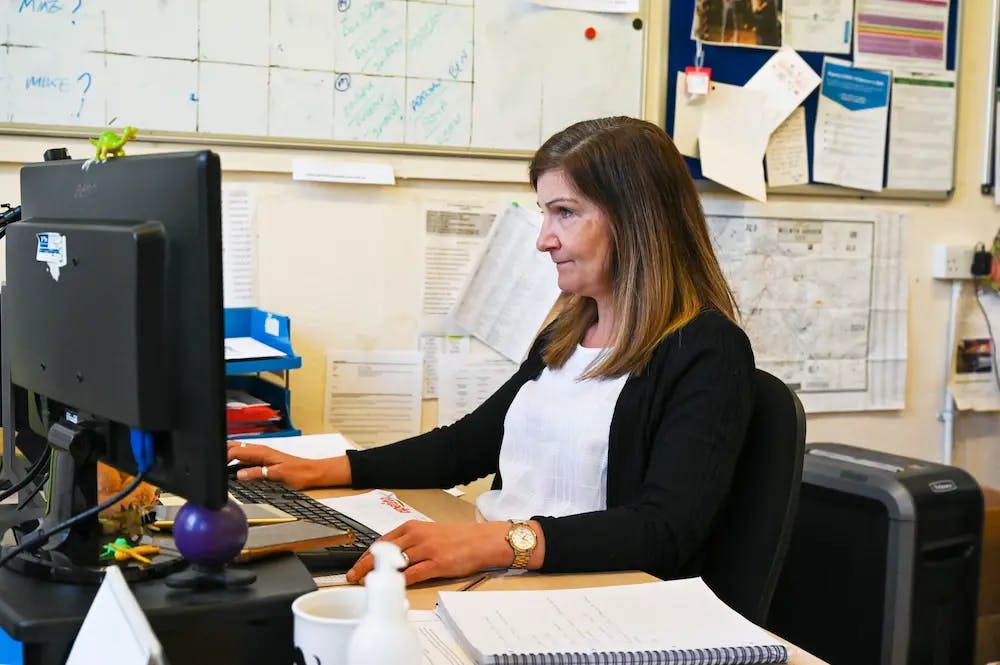Financial Assessment For Care Fees

Estimated Reading Time: 9 minutes
This article was reviewed by Sara Chapin, Director of Finance at Lottie, on 24th January 2025, to ensure accurate and trustworthy information for care seekers. Sara Chapin has been a Certified Public Accountant with the National Association of State Boards of Accountancy since 2017. Next review due January 2026.
A financial assessment is an important step in paying for care fees. You may be eligible for partial or complete support from your local council when you receive home care support or move into a care home.
Your eligibility will be determined through a financial assessment for care fees (often referred to as a means test). Here, your savings and income will be evaluated, aling with property and any other assets if you’re moving into a care home.
This article will guide you through the process of getting a financial assessment for care fees, including how to prepare and whether you’ll need to sell your home to pay for care fees.
Kickstart your care search
Discover the best care homes in your area through Lottie.
In this article:
- What is a financial assessment for care fees?
- Savings thresholds in the UK
- How a financial assessment works
- Selling your home to pay for care fees
- Helpful resources
What Is A Financial Assessment For Care Fees?
A financial assessment is an evaluation by your local council that will determine if you qualify for financial assistance when paying for care. This assessment will be carried out after a care needs assessment, and will determine who pays for your care.
Your savings and income will all be added up (along with any properties or other assets if you need care in a care home), before any debts are subtracted to give a total figure. This figure will indicate whether you qualify for assistance with care fees and if so, how much.
You’ll be treated as an individual when assessed, so your partner or spouse’s income and assets won’t be considered in your total figure.
Exactly how this assessment works will depend on whether you’re moving into a care home or are looking to receive home care.

Financial assessment for care fees in a care home
When you move into a care home, the value of any property you own will be factored into the financial assessment, provided somebody such as a spouse, partner, civil partner, close relative over the age of 60, dependent child or disabled relative isn’t living there. This makes it almost guaranteed that you’ll have to partially or fully pay for your own care if you own a property.
In England, local councils will help people pay for care costs if they have savings worth less than £23,250.
Financial assessment for home care
Care at home arranged by your local council usually isn’t free. For health and social care to be arranged, you’ll first need to get a care needs assessment. Based on the results of this assessment, you could be eligible for free care at home.
After you’ve had a care needs assessment and have agreed on a care plan, you’ll have the financial assessment.
The value of your home won’t be included in a means test when receiving home care, meaning you’re more likely to receive financial support.
We’re here to help you find the right care home for you or your loved one. You can request a free list of care homes from our Care Experts, who will then share homes matching your budget, location and type of care needed. You can also search for care through our easy-to-use directory.
Savings Thresholds In The UK
Whether or not you have to pay for your own care and how much funding support you qualify for depends on the total value of your savings, income and assets, along with where you live in the UK. This value will be determined during a financial assessment.
If your savings are above the upper threshold, you’ll have to pay the full cost of care. If your savings are below the lower threshold, you’ll qualify for full support with funding. If your savings are between these two thresholds, you’ll qualify for some funding support but will be expected to pay for the rest yourself.
In England, any money you have between the £14,250 and £23,250 thresholds is classed as producing a 'tariff' income. This means that for every £250 (or part of £250) you have between these two thresholds, you're classed as having an extra £1 of weekly income. For example, if you have savings and income worth £14,750, your local authority will treat you as having a weekly tariff income of £2 which is paid towards your care.
If your savings are below £23,250 in England, your local council is required to share at least one care option that doesn’t require a top-up fee.
Here are the UK saving thresholds that could impact your financial assessment for care fees in 2025/26:
England
Upper threshold: £23,250
Lower threshold: £14,250
Scotland
Upper threshold: £35,000
Lower threshold: £21,500
*When paying for home care in Scotland, councils are recommended to disregard the first £10,000 of someone's savings if they're over the State Pension age, and the first £6,000 if they're under it. This person will then make a weekly tariff contribution towards their home care, based on the rest of their savings.
Wales
Upper threshold: £50,000 for a care home and £24,000 for home care
Lower threshold: N/A
Northern Ireland
Upper threshold: £23,250
Lower threshold: £14,250
How A Financial Assessment For Care Fees Works
Applying
A financial assessment for care fees will take place immediately after having a care needs assessment or carer’s assessment. You won’t have to pay for any of these assessments.
To get a financial assessment then, you’ll need to arrange a care needs assessment or carer’s assessment (depending on if you’re the care seeker or caregiver).
You can arrange either by contacting your local council or finding local authority adult social care services near you. All you need to do is enter your postcode and click on the relevant link for contact details.
The assessment
Your or your loved one’s income will be assessed through a means test. Here, the local council will look at your loved one’s savings, pensions, benefits and earnings to determine whether they’ll need to pay towards their care, and how much if so.
The person conducting the assessment will likely ask the person being assessed (or their carer or family member) to fill out some forms regarding their finances, along with declaring that any information provided is true and correct.

Getting the results
After you’ve been assessed, your local council will let you know whether you fall below the threshold for assistance with care fees.
If you do fall below this lower threshold and require home care, you’ll be offered a personal budget to help pay for your care fees (meaning the council will either make a direct payment into your bank account each month or they’ll organise your care and you’ll receive a regular bill to pay towards it). If you need support in a care home, the council will pay the home directly.
If your earnings, savings and assets are between the thresholds, you’ll be expected to pay a partial amount towards your care. If you live in England and have less than £23,250, your local council has to share at least one care option that doesn’t require a top-up fee.
If your earnings, savings and assets are above the upper threshold, you’ll be expected to pay the full amount towards your care. Many private funders claim Attendance Allowance to help pay for care.
Your local council will regularly reassess your financial situation, often annually.
You can ask the council to explain how your finances were assessed if you’re unsure of the results or think there may have been a mistake.
Financial Assessment Calculator
There are numerous online calculators that will help you work out whether or not you have to pay for care and if so, how much.
For example, Legal & General have created a care costs calculator.
This tool will give you an idea of how much you’ll need to pay for care, along with any other support available.
All you need to do is enter the type of care you need (in a care home or home care), the value of your home (if you own it), your savings and investments, any other income you receive and where you’re looking for care.
You’ll then get a detailed explanation of whether you’re likely to qualify for care funding and the next steps.
To make things clearer, we have guides explaining care funding in England, Scotland and Wales.

Selling Your Home To Pay For Care Fees
If your loved one requires care in a care home, the financial assessment will include the value of their property (unless somebody such as their spouse or partner is still living in it). If they require care in their own home, the means test won’t include the value of their property. This is known as a property disregard.
If your loved one owns their own home, they’ll likely be above the threshold for care fees, so they will have to pay for their own care costs. This means they may have to sell their home to pay for care, depending on whether they can afford to pay for their own care without doing so.

Helpful Resources
For more information about care fees and what support you may be entitled to, be sure to check out our handy resources below:
Care home average UK costs and fees
Deferred payment agreements for care home fees
Jointly owned properties and care home fees
Lottie matches care seekers with the best care homes for their needs. You can request a free care home shortlist from our Care Experts, who will share homes matching your budget, location and type of care needed. You can also search for care through our easy-to-use directory.
Frequently Asked Questions
What does the £86,000 cap on care costs mean?
A cap on care is a limit to how much you’ll have to spend on your own care.
A cap on care fees of £86,000 was set to be introduced, but this has now been scrapped by the new Labour government.
Can I gift my house to my children to avoid paying care fees?
Your local authority will conduct a thorough investigation of all your savings and assets before agreeing to pay for your care. If they believe you’ve intentionally given away your property to avoid paying care fees, they may still take your property’s value into account, meaning you’ll be required to pay for your own care regardless of whether or not you gift your property.
Free Care Fees & Funding Email Course
Written by our team of experts and designed to help families fund later life care in England.




